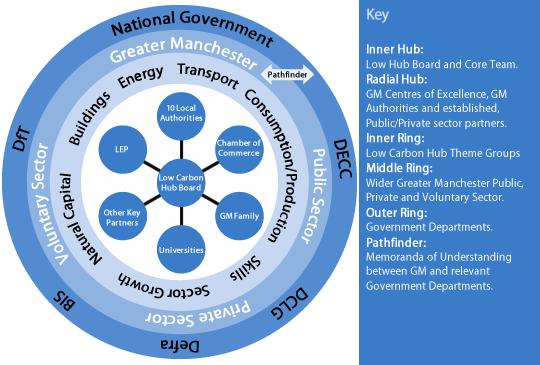
Investing in green growth for Greater Manchester
_
The GM Climate Change Implementation Plan 2013-15 was approved by AGMA in January 2013. Since then, the GM Environment Team has worked with the Low Carbon Hub Sub-groups and Districts to develop detailed Work Programme Priorities for each Sub-group, plus identifying the `enabling’ actions required to ensure the Low Carbon Hub operates effectively.
Why is Low Carbon Transition required?
There are major economic drivers behind the need for a low carbon transition in Greater Manchester:
- GM’s diverse low carbon sector is maintaining strong growth rates of 5%, despite the recession.
- There is a £3.4 trillion global market demand for GM’s innovative environmental goods and service companies.
- Fossil fuel prices and availability are driven by volatile global factors: increased local renewable generation is vital for energy security and GM’s economy.
- Rising energy costs are increasing fuel poverty and undermining business viability.
- Resource and raw material constraints will also lead to rising costs for businesses.
- Electrification of heat and transport will transform our energy system.
- GM’s natural environment has unrecog- nised economic value and significant further potential, including a central role in building resilience to a changing climate.
A low carbon, well adapted economy will make Greater Manchester more resilient to future changes, more competitive in the increasingly global marketplace and reinforce Manchester’s standing as a leader in innovation.
Foreword from Sir Richard Leese, Leader of Manchester City Council and Chair of the GM Low Carbon Hub Board
Developing a low carbon economy remains an integral part of our recently refreshed Greater Manchester Strategy. At a recent consultation event on the strategy, attended by the Rt. Hon Greg Barker MP, Minister of State for Climate Change, I emphasised that a succesful transition to a low carbon economy was fundamental to the growth of Greater Manchester: “ Without green there will be no growth”. Since the formation of the Low Carbon Hub in 2012, I have been pleased to sign a number of groundbreaking agreements to cement Greater Manchester’s relationship with Whitehall, including Memoranda of Understanding with DECC and Defra and the GM Climate Local Agreement. I’ve also welcomed the contributions from low carbon projects and innovations from GM’s leading-edge businesses and universities who share our vision for Greater Manchester. Reducing our carbon emissions and adapting to the impact of climate change is, the responsibility of a great number of actors who are brought together in the Low Carbon Hub to deliver the Greater Manchester Climate Change Strategy. Together we will invest in green growth in Greater Manchester for the benefit of our businesses and people now and in the future.
The Greater Manchester City Deal
The GM City Deal, agreed in March 2012, included a `low carbon’ priority with three key elements:
- developing a GM Low Carbon Hub as a centre of excellence;
- establishing a joint venture with the Green Investment Bank to finance energy efficient infrastructure; and
- developing memoranda of understanding between GM and key government departments to deliver shared priorities.
The development of a Low Carbon Hub (LCH) for GM integrates the delivery of multiple carbon-reduction measures. It represents a shift from strategy development to prioritised delivery. GM has embedded the Hub within the network of Greater Manchester Centres of Excellence and created strong private and voluntary sector partnership support. The Hub aims to harness the knowledge of our universities with the innovation of our businesses under the strong public governance provided by the Greater Manchester Combined Authority.
The LCH aims to deliver the GM Climate Change Strategy that has four primary objectives:
- We will make a rapid transition to a low carbon economy.
- Our collective CO2 emissions will have been reduced by 48%.
- We will be prepared for and actively adapting to a rapidly changing climate.
- `Carbon literacy’ will have become embedded into the culture of our organisations, lifestyles and behaviours.
Contributor Profile
Mark joined AGMA in May 2012 as Director of Environment for Greater Manchester. In this role, Mark provides strategic support to the Greater Manchester Low Carbon Hub by leading the development and delivery of business plans and investment frameworks for environment and low carbon projects & programmes, plus research & public policy development.


